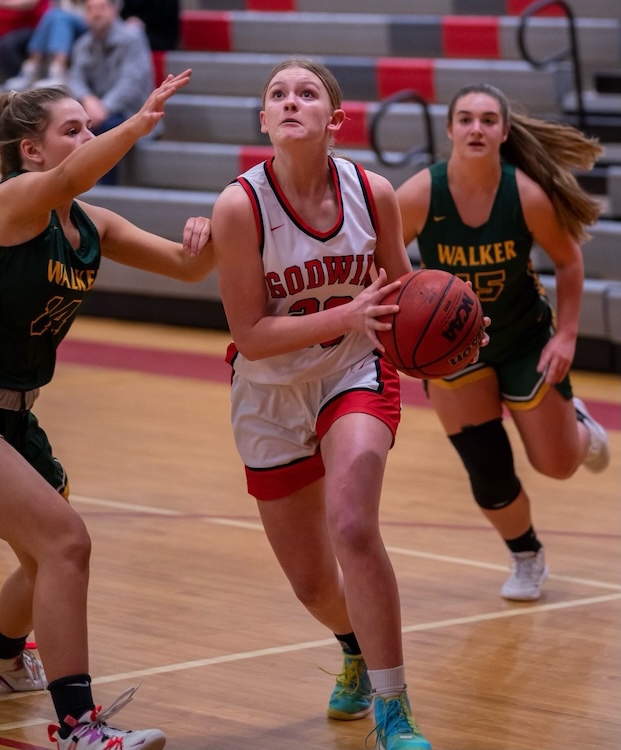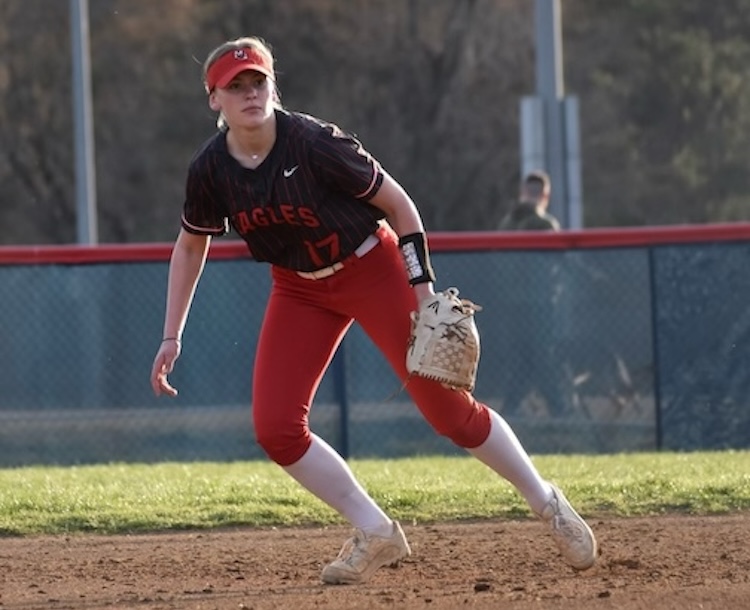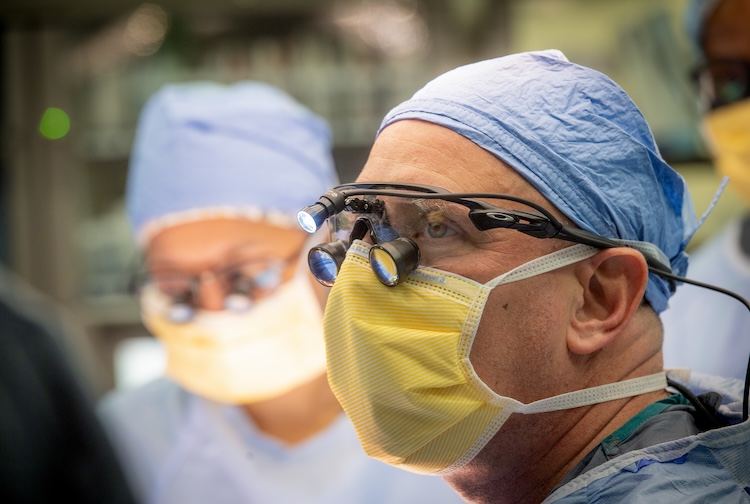Head in the game: VCU-led study looks to advance concussion care for female athletes
The project aims to shed light on how concussions are impacting women and girls, who have historically been left behind in sports injuries studies.
July 12, 2024 VCU researchers say there is a disparity in current studies on athletes and concussions, with more studies including male participants than female participants. (Contributed photo)
VCU researchers say there is a disparity in current studies on athletes and concussions, with more studies including male participants than female participants. (Contributed photo)
By Olivia Trani
Bella Ross isn't used to holding back when it comes to sports. The rising junior is an active athlete, having played on varsity teams for softball and basketball at Godwin High School in Henrico County, Virginia, as well as travel teams through the Amateur Athletic Union (AAU). However, after sustaining multiple concussions, Bella has had to adopt a new approach to engaging in sports, one that prioritizes protecting her brain.
“I tell her 'You only get one brain,' and she's got a good one, so we're trying to protect it as best we can,” said her mother, Stephanie Ross. “You want your kids to be happy, but you want them to be safe as well.”
Bella had her first concussion in sixth grade after falling off her bike and hitting her head on the ground. She sustained a second in eighth grade from falling backwards during a basketball game. She experienced her third concussion last year, this time caused by a head-to-head collision with another basketball player.
“I remember just not feeling right, like I was in a fog. I felt slow and dizzy, and my head was hurting,” Bella said. “The last concussion was especially hard because it happened around the time of playoffs for my basketball team and then softball season was right around the corner. I tried to recover in time so that I could start the season with the rest of my team.”
After her latest concussion, she made the hard decision to give up playing travel basketball with AAU to reduce her risk of future injuries.
Bella's experience is becoming more common in the United States. About 1 in every 4 people are estimated to report at least one concussion by the time they are adolescents, according to national data, ith an increasing number of teens experiencing concussions from organized sports.
Young female athletes are particularly affected by this trend, as they are more likely to sustain a sports-related concussion, experience more severe symptoms, and take longer to recover. However, despite facing greater risk for this kind of injury, women, and girls are significantly underrepresented in research on sports-related concussions. A review of the most prominent studies on sports-related concussions found that 80% of the research participants were male. Moreover, more than 40% of these studies included no female participants at all.
This study is really about creating a foundation of knowledge to fill in gaps that we have been missing for some time, Oldham said. We hope to use this information to develop injury prevention training programs that don't leave any athletes behind.
Jessie Oldham, Ph.D.,VCU School of Medicine
Researchers at Virginia Commonwealth University have been working with young athletes like Bella to better understand how male and female adolescents experience concussions differently, as well as how those differences influence their recovery and risk of future injury.
“Concussions are such an individualized injury. Some have a concussion and recover in ten days, whereas for others it may take a few months,” said Jessie Oldham, Ph.D., an assistant professor in the VCU School of Medicine's Department of Physical Medicine and Rehabilitation who is leading this study. “As we learn more about how concussions impact people differently, we hope to keep shifting away from a 'one size fits all' approach to recovery and injury prevention. The ultimate goal is to develop individualized treatments for athletes that account for inherent demographic characteristics, like sex, age, and concussion history.”
This study is funded by the National Institutes of Health's Building Interdisciplinary Research Careers in Women's Health program, which supports junior faculty with research focused on sex and gender influences on health. At VCU, Oldham is an affiliate faculty member in the Institute for Women's Health and serves as the institute's co-chair of the Female Athlete Research Development Group. Her interest in this field began well before becoming a researcher.
“I was involved in gymnastics growing up, and then I cheered in college. During that time, I had a couple of concussions, so I've always had a passion for injury prevention and recovery for female athletes,” Oldham said. “Sustaining a concussion as a young athlete adds a whole new layer of complexity as well. Going through puberty brings about so many physical and emotional changes, which can influence a person's injury and recovery.”

Bella Ross experienced her third concussion last year after a head-to-head collision with another basketball player. She made the hard decision to stop playing travel basketball to reduce her risk of sustaining more injuries. (Contributed photo)
For this study, Oldham and her colleagues have recruited about 70 families with adolescents active in organized sports in the Richmond area. They will continue recruiting adolescent athletes, ages 10 to 19, through June 2025.
Stephanie found out about the project during a concussion clinic visit through the Department of Physical Medicine and Rehabilitation and saw an opportunity to help experts develop more effective strategies for injury prevention.
“I'm a mom of four kids who are very active in sports, but I'm also a physical therapist who works with patients with concussions. So as a parent and healthcare provider, I'm interested to see how we can best treat and evaluate those with concussions, as well as improve their recovery time,” she said.
For Bella, taking part in this study also gave her the chance to learn about a topic that she ultimately hopes to pursue as a career.
“I want to be a pediatric physical therapist, so I thought this was a good opportunity to be involved in some of the research that impacts this field,” she said.
Understanding the long-term impact concussions have on girls and women
Oldham's research is specifically looking to better understand potential sex differences in how concussions impact future injuries. Athletes who sustain a concussion are more than twice as likely to experience a musculoskeletal injury - like sprains, strains, and fractures - in the following year, but it's not well understood why this occurs.
Oldham believes that concussions may be elevating the risk of future injury by interfering with the body's startle reflex - a defensive response against sudden threats or events. In an earlier study recently published in the Journal of Head Trauma and Rehabilitation, she found that traumatic brain injuries such as concussions can suppress a person's ability to react to unexpected stimuli.
“When you think about an athlete engaging in a sport, they're having to respond quickly to a constantly changing environment, whether that's keeping track of a ball or avoiding collisions with another player,” Oldham said. “My overarching hypothesis is if athletes with a history of concussions are not able to respond to these kinds of stimuli as they normally would, they are potentially more likely to get hurt.”
As part of the study, the research participants undergo a series of assessments to better understand how concussions have influenced their acoustic startle reflex, visual function and reaction time. For one of the exercises, the research team tests a participant's startle response by measuring the activity of muscles around their eyes when they blink following an unexpected noise. This is because people may blink more intensely than they normally would when they are startled. In another exercise, the participants are assessed on how accurately their eyes track various objects across a screen. They also take part in a reaction time test, where they try to tap their finger on a dot on a screen as soon as it changes color. All of these exercises are intended to quantify how well a participant is able to react to their environment.

Taking part in this study is also giving Bella Ross the chance to learn about the field of pediatric physical therapy, a career path she is interested in pursuing. (Contributed photo)
In addition to reflex assessments, the researchers are interviewing each participant who has had concussions about their psychological readiness to return to sports. As part of the interview, participants are asked to rate how stressful the event of their concussion was to them, how confident they feel about returning to sports, as well as their fear of getting reinjured.
“One of the understudied areas of concussion research is the impact this injury has on mental health. We don't have a firm understanding of how concussions impact us psychologically, and how that impacts our future risk of injury in return,” Oldham. “This also ties back to sex differences in concussions, because female athletes tend to report more symptoms related to mental health, such as anxiety and depression, compared to male athletes.”
To assess long-term impacts, the researchers check in with the participants every month for three months to keep track of any injuries caused by sports or other activities. Oldham is conducting additional studies that will check in with participants at 6-month and 12-month intervals. Collecting this data will allow the research team to determine whether concussion-impaired reflexes or any other factors influence a person's likelihood of reinjuring themselves, and whether these outcomes vary by sex.
“This study is really about creating a foundation of knowledge to fill in gaps that we have been missing for some time,” Oldham said. “We hope to use this information to develop injury prevention training programs that don't leave any athletes behind.”
Families interested in learning more about this project can contact Jessie.Oldham@vcuhealth.org for information.
Learn more about our innovative researchers and their projects




